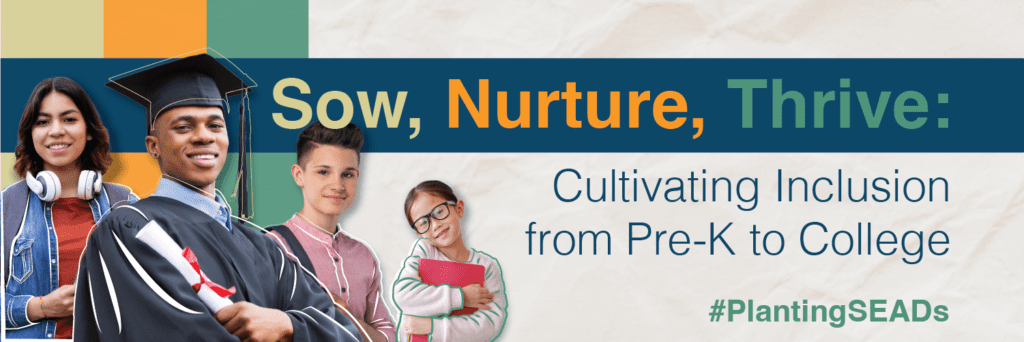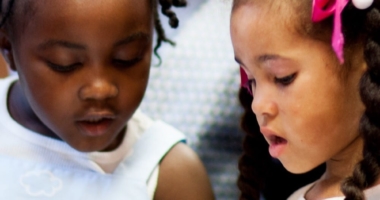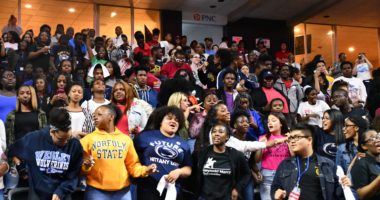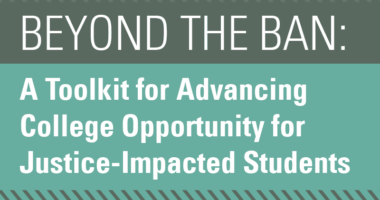
All students deserve to learn in a school environment that supports their social and emotional growth from pre-K to college. This is especially crucial for students of color and students from low-income backgrounds, who are disproportionately impacted by the pitfalls of a preexisting biased environment that does not consider the context in which students live.
When school and district leaders consider contexts like societal realities (e.g., racism, sexism, homophobia), individual realities (e.g., socioeconomic status, family dynamics, experiences in schools, access to opportunities), and cultural backgrounds to support students, it all influences social, emotional, and academic development (SEAD).
“Social, emotional, and academic development (SEAD) addresses the whole child/student, which means taking a holistic approach to supporting students within a positive school climate that creates learning spaces where students feel emotionally and mentally safe to be their authentic selves.”
What is SEAD?
Social, emotional, and academic development (SEAD) addresses the whole child/student, which means taking a holistic approach to supporting students within a positive school climate that creates learning spaces where students feel emotionally and mentally safe to be their authentic selves.
Students want to learn in a safe environment but today, Black and Latino students are grappling with a host of issues that negatively impact their mental well-being. Gun violence, discriminatory school discipline practices, an unending student-debt burden, classroom censorship, and an increase in anti-LGBTQ+ and anti-diversity, equity, and inclusion (DEI) policies, pose a constant threat to a safe and nurturing school climate.
To create physically safe and emotionally supportive environments for all students, schools and colleges must adopt evidence-based approaches. In this campaign, #PlantingSEADs, we are amplifying resources to support advocates, educators and school leaders in their efforts to cultivate an intentionally inclusive school environment from the P-12 to the higher-ed level. Learn more and share the resources below.
Honest History and Anti-DEI Bills
@edtrust There has always been representation in curricula & that representation is predominantly White. In a study that looked at 300 books, we found that almost 1/2 of the people of color centered in these books were stereotyped. That's why we created a new book tool for representational balance to help curriculum publishers understand how people, groups & topics are represented in material. Check it out here: https://edtru.st/BookTool.#Teachers #teachersoftiktok#BookBans #representationmatters ♬ original sound - The Education Trust
@edtrust All students deserve to learn an accurate & honest #USHistory. #criticalracetheory #crt #classroomcensorship #bannedbooks #education #fyp ♬ ■ News News-Drone-IT-AI(963995) - ImoKenpi-Dou
@edtrust Anti-#Woke and anti-#CriticalRaceTheory legislation is not just an issue for the state of #Florida, says state Sen. Shevrin D. Jones. These kinds of legislation have devastating implications for the entire country. #fyp ♬ original sound - The Education Trust
 Teaching Honest History
Teaching Honest History
As Ed Trust continues to fight against this so-called anti-CRT movement, we’ve gathered a diverse set of voices who discuss this hot-button issue—from an education historian, to former teachers and former students in the public school system, and others.
 Can’t Be Erased
Can’t Be Erased
Our campaign, “Can’t Be Erased” (#CantBeErased) highlights the importance of the various banned books by Black, LGBTQ+, and Latino authors, and how a continuous move towards repression is ultimately regressive education.
 The Search for More Complex Racial and Ethnic Representation in Grade School Books
The Search for More Complex Racial and Ethnic Representation in Grade School Books
To prepare all students to function in a multicultural world, to build intellectual skills for addressing tomorrow’s problems, to push back against a growing censorship movement, and to advocate for authentic racial representation in books, Ed Trust offers six recommendations to move curricula development toward representational balance.
 How Colleges’ Anti-DEI Policies Affect Campus Racial Climate
How Colleges’ Anti-DEI Policies Affect Campus Racial Climate
Students of color often experience college differently than their White peers because of the negative attitudes, behavior, and practices that some peers and faculty have toward students of color due to their race and/or ethnicity.
P-12

Creating Safer Schools: A Case Study
by Nancy Duchesneau and Manny ZapataSchool safety and student well-being are crucial to the social, emotional, and academic development of young people. Simply put,…

How Certain States Are Supporting Social, Emotional, and Academic Development (SEAD)
by Ed TrustSocial, emotional, and academic development (SEAD) is a holistic approach to supporting students’ development and learning that is integral…

Future of Assessments: Centering Equity and the Lived Experiences of Students, Families, and Educators
by Sarah Mehrotra and Nicholas Munyan-PenneyAddressing inequities in the educational outcomes — particularly for students of color and students from low-income backgrounds — cannot…

How School Discipline Impacts Students’ Social, Emotional and, Academic Development (SEAD)
by Blair Wriston and Nancy DuchesneauLast year, Mississippi schools used corporal punishment 4,300 times — and the impact affects more than the students experiencing…

Equal Is Not Good Enough
by Ivy MorganWhen it comes to providing children with a high-quality education, money matters. Yet, the U.S. education system is plagued…

Improving Rigor & Representation in P-12 Curriculum
by Ed TrustEvery student in America deserves to have access to a high-quality and culturally relevant curriculum, coursework, books, and other…

Ensuring Whole Child Well-Being Through Social, Emotional, & Academic Development
by Ed TrustChildren need more than just learning a specific set of skills and information. They are growing human beings with…

Social, Emotional, and Academic Development Through an Equity Lens
The majority of public schools and districts in the U.S. report they are working to support the social and…

Educator Equity & Diversity
by Ed TrustWhile students of color make up more than 50% of the K-12 public school student population, teachers of color…
Higher Education

Segregation Forever: Private Universities Haven’t Leveraged Race-Conscious Admissions to Increase Diversity. What Now?
by Wil Del Pilar, Gabriel Montague, and Sandra PerezThe Supreme Court has banned the use of race-conscious practices in college admissions. However, enrollment at selective public institutions…

Affirmative Action
by Ed TrustAffirmative action has historically been an instrument that colleges can use to ensure that students of color receive fair…

Key Criteria for Undocumented Student Higher Education Access and Success
by Ed TrustOne in every 50 students enrolled in U.S. higher education is undocumented. Yet, many undocumented students face barriers in…

Faculty Diversity and Student Success Go Hand in Hand, So Why Are University Faculties So White?
by Jinann Bitar, Gabriel Montague, and Lauren Ilano, Ph.D.Faculty diversity plays a key role in college student completion and can have a major impact on students’ sense…

Expanding College Access
by Ed TrustCollege should be available and accessible to everyone who seeks a postsecondary degree. However, the unfortunate truth is that…

For Student Parents, The Biggest Hurdles to A Higher Education are Costs and Finding Child Care
by Brittani Williams, Jinann Bitar, Portia Polk, Andre Nguyen, Gabriel Montague, Carrie Gillispie, Antoinette Waller, Azeb Tadesse, and Kayla C. ElliottIt's hard to be a student parent. College students who are parenting must juggle work and family responsibilities while…

How Student Debt Harms Black Borrowers’ Mental Health
by Ed TrustApproximately 45 million Americans carry $1.7 trillion in student loan debt, but the financial challenges facing Black borrowers are…

Beyond the Ban
by Satra Taylor, Kayla C. Elliott, Brittani Williams, Jessie Hernandez-Reyes, Anna Hyunah Byon, William Freeman III, Omari Amili, Montrell Carmouche, Alexa Garza, Jarrod Wall, Rabia Qutab, Patrick Rodriguez, Mary Enoch Elizabeth Baxter, Christopher Garcia, Taylar Nuevelle, and Mysia PerryThe United States has the world’s largest prison system. While the U.S. constitutes only 5% of the global population,…
Segregation Forever?
by Andrew Howard NicholsWhile the COVID-19 pandemic and the police killings of Breonna Taylor, George Floyd, and Rayshard Brooks have shined a…

Black Student Debt
by Ed TrustWe know that Black students face greater hurdles when it comes to financing their college education and repaying student…
Partner Resources
 One Million Teachers of Color (1MToC)
One Million Teachers of Color (1MToC)
Championing a Stronger, More Diverse Educator Workforce
 Unidos US
Unidos US
Analyzing Inclusion of Latino Contributions in U.S. History Curricula for High School

 Word in Black
Word in Black

 Unite Against Book Bans
Unite Against Book Bans National Council on Teacher Quality
National Council on Teacher Quality
 New America
New America Generation Hope
Generation Hope